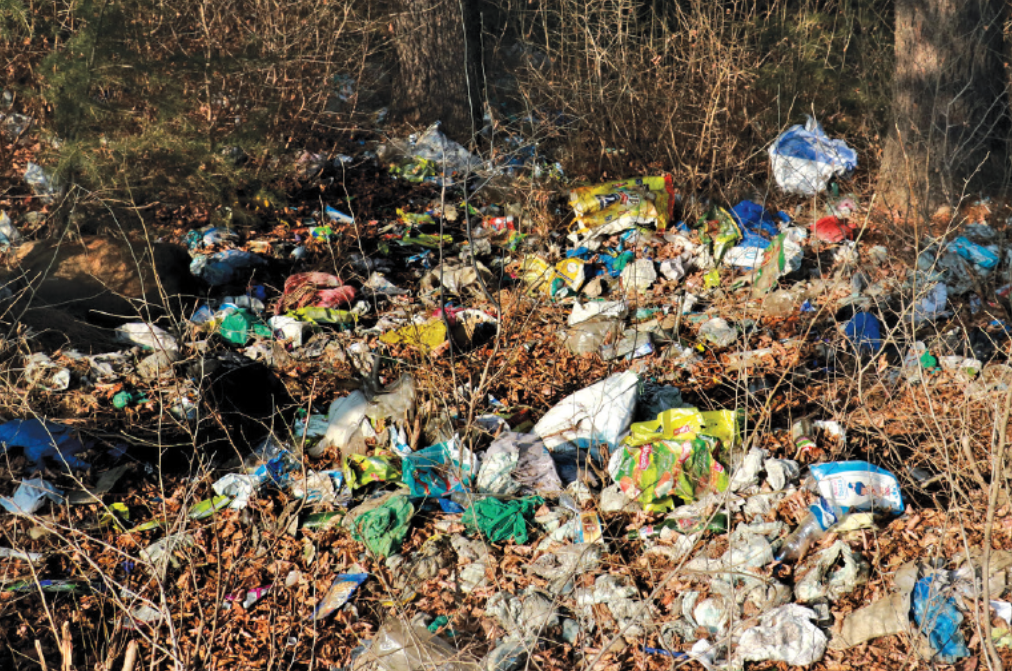Government’s failure to enforce ban on use of polythene, single use plastics is taking toll on our water bodies, forests, soil.

Plastic pollution is emerging as one of the major threats to the fragile environment of Jammu and Kashmir. Notwithstanding blanket ban on use of polythene and single use plastics, these non-biodegradable products continue to be extensively used in J&K.
Polythene and single-use plastics, slowly but steadily, are polluting water bodies, forests and soil in J&K. Use of polythene, carrying and storing food items, is detrimental to the health of humans.
It was on August 12, 2021 that the Ministry of Environment, Forest & Climate Change issued notification by virtue of which manufacture, import, stocking, distribution, sale and use of identified single use plastic (SUP) items shall be prohibited across the country with effect from July 1, 2022.
Subsequently the Jammu and Kashmir Pollution Control Committee (JKPCC) issued public notice prohibiting production, stocking, distribution, sale and use of single-use plastic in the Union Territory.
The manufacture, import, stocking, distribution, sale and use of single use plastic, including polystyrene, commodities shall be prohibited with effect from July 1, 2022. The prohibited items include polythene carry bags. plastic sticks for balloons, plastic flags, candy sticks, ice-cream sticks, polystyrene, thermocol for decoration, plates, cups, glasses, cutlery such as forks, spoons, knives, straw, trays, wrapping or packaging films around sweet boxes.
Despite the passing of nearly two years since the announcement of the ban, there is wanton use of polythene and related products in J&K—in absence of regulation. More than its use, it is the unscientific disposal of polythene and single use plastics that is silently killing our fragile eco-system.
There has been outcry over ill-effects of polythene on our environment. In 2006, the J&K High Court had imposed a complete ban on entry, use and sale of polythene bags at tourist places and healthcare institutions but authorities failed to implement the order.
On June 18, 2008, the J&K government banned all kinds of polythene bags in the state by issuing SRO 182 under the J&K Non-Biodegradable Material (Management, Handling and Disposal) Act, 2007. Again authorities failed to implement the ban.
But we must think, why is polythene still in demand despite the ban in J&K? It’s because there are no eco-friendly alternatives, rather resolve by the government and stakeholders to care for the environment!
It was on August 5, 2009 when the Government of erstwhile J&K state had signed a Memorandum of Understanding with an Italian company to become first-state to go for bioplastics production from corn, wheat and potato starch as an alternative for polythene.
The MoU for setting up the country’s first integrated factory of bio-plastics was inked between JK Agro Industries Corporation Ltd and the Italian company. The bio-degradable polythene made from potato starch, wheat and starch degrades within four months as compared to polythene made from plastic products and chemicals.
This was the perfect solution to save J&K from polythene pollution, however, the ambitious eco-friendly project faced many roadblocks and was shelved even before its start!
As per estimates, over 51,000 tonnes of plastic waste is generated in J & K annually, but in absence of a scientific process to collect and segregate plastics at source, non-bio-degradable items especially plastic bottles and polythene are dumped into water bodies, landfills and forest areas in the Union Territory.
As per studies, 220 million tonnes of plastic waste are estimated to be generated globally this year. A Swiss non-profit EA Earth Action states in its latest study released on Plastic Overshoot Day on April 11, 2024 that, “just 12 countries are responsible for 60 percent of the world’s mismanaged plastic waste, the top five being China, USA, India, Brazil, and Mexico,” “The global average plastic waste per person this year will rise to 28 kilograms.”
As per the study, researchers have found that almost 50 per cent of the world’s populations has been living in areas where plastic waste generated has already exceeded the capacity to manage it. It estimates that by September, 2024, the figure will rise to 66 per cent due to continuous pressures placed on developing countries by the plastic pollution crisis.
Another study states India forms part of the “waste sponges,” countries that have low consumption of plastic yet a high level of plastic pollution arising from it through plastic imports.
There must be focus on scientifically disposing of polythene and plastic providing alternatives. The Rice University research team in the United States are developing a technique that transforms plastic waste into usable hydrogen fuel without pollution. Back home, we have immense potential to provide alternatives to polythene bags.
A voluntary environmental group Nigeen Lake Conservation Organisation (NLCO) headed by Manzoor Wangnoo has been working for over two decades to retrieve tons of polythene and plastic bottles dumped in various lakes in Srinagar.
Importantly, NLCO has taken the initiative to manufacture eco-friendly cotton bags as alternatives to polythene to save water bodies from plastic pollution. If NLCO can start such an initiative, why are big corporate houses shying away from their responsibility to contribute their bit to prevent plastic pollution?
Corporate Social Responsibility apart, isn’t it Common Man’s Responsibility to save our environment from further deterioration. Let’s join hands to prevent all forms of pollution to make J&K ‘Paradise on Earth’ again.
Article Credit: greaterkashmir